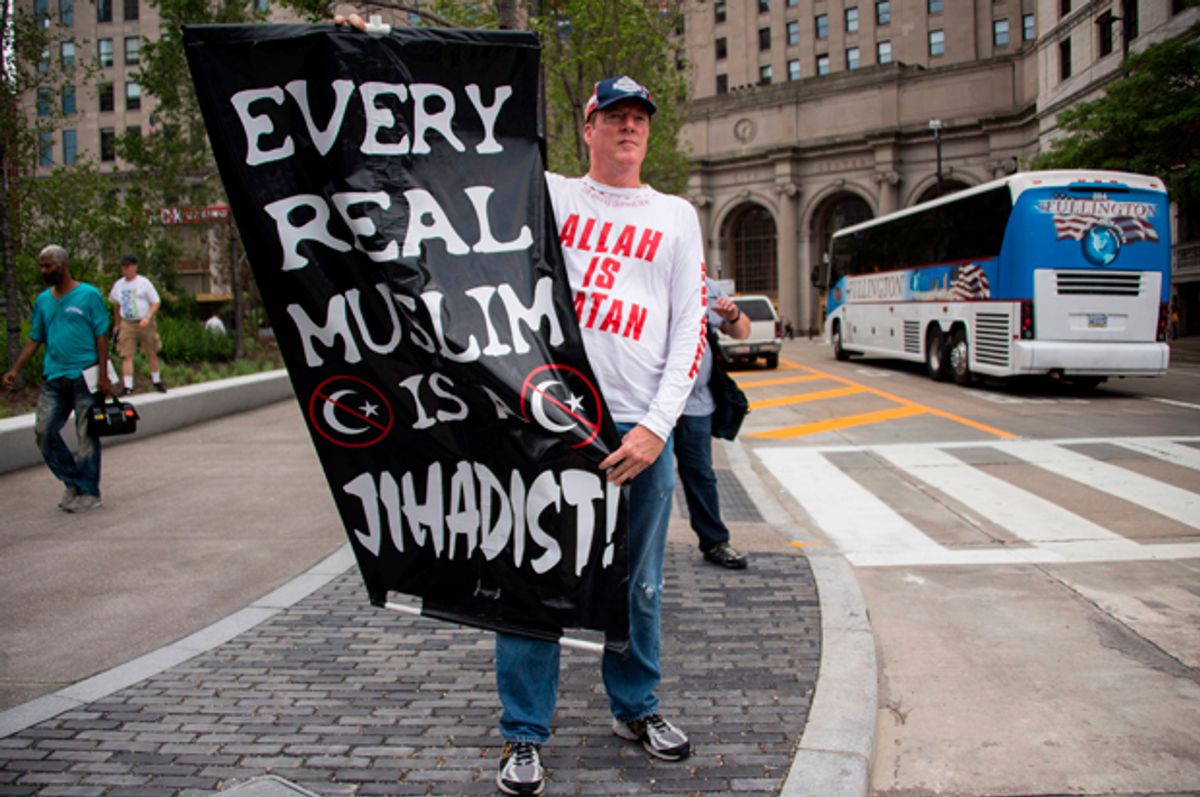The rising costs of Islamophobia can now be measured in the number of dead. Three Bangladeshi Muslims in New York and a Lebanese man in Oklahoma were murdered in a recent spate of anti-Muslim hate crimes.
Khalid Jabara, a 37-year-old Christian immigrant from Lebanon, was shot and killed on the evening of Aug. 12 by his neighbor, 61-year-old Stanley Majors. His murder was the culmination of years of epithets (“dirty Arabs” and “Moo-slems”) and malevolence by Majors, who had an “unusual fixation” with the Jabara family.
In broad daylight on Aug. 13, Bangladeshi Imam Maulama Akonjee and his assistant, Thara Uddin, were shot execution-style in the back of their heads as they walked home from prayer at a mosque. A few weeks later on the night of Aug. 31, Nazma Khanam, a 60-year-old Bangladeshi woman, was stabbed multiple times as she strolled home
And while the macabre details of these killings is horrifying, the context in which they occurred remains the most disturbing and consequential part.
The rhetoric employed by Trump in his effort to “Make America Great Again” has transcended rallies, television studios and Twitter. And we have learned that those words can sometimes be worse than sticks and stones.
The Republican Party’s 2015-to-2016 Islamophobia sound track is teeming with great hits. Each candidate has taken the opportunity to burnish his credentials as an Islamophobe for the electorate. And fans are still clamoring for more.
Trump has been the most frequent and fanciful contributor. And thanks to $3 billion worth of free media, he has easily been the most widely circulated. He has given us a proposal to ban Muslim immigration to the United States. An idea to implement a database and special identification cards for American Muslims has been floated. We have heard about the Muslims in New Jersey who were celebrating after 9/11. There was also a story of Muslims being shot with bullets dipped in pigs’ blood by General John Pershing.
Each candidate’s shocking statement about Muslims is eclipsed by a more lurid one from another candidate. For no Republican candidate with true presidential aspirations wants to lose this important issue. Ted Cruz called for heightened law enforcement to patrol and secure “Muslim neighborhoods.” Newt Gingrich wanted every Muslim tested for his or her sympathies regarding sharia law. Neurosurgeon Ben Carson warned that only a schizophrenic Muslim could embrace American democracy.
These aspersions about Muslims seek to dehumanize them and cast them as a “foreign,” menacing group unworthy of our sympathies. This is where theories about Muslims and their incompatibility with American values gain traction.
Trump demonstrated this as he questioned whether Ghazala Khan, a Gold Star mother, had been deliberately silenced at the Democratic National Convention as her husband railed against the Republican candidate. As Amana Fontanella-Khan wrote, where most saw a mother grieving over the death of her son, Trump tried to depict someone “fundamentally different from other Americans” and undeserving of empathy.
Colin Kaepernick also learned the cost of protest in Donald Trump’s America when his decision to sit during the national anthem was falsely attributed to a recent conversion to Islam. As Khaled Beydoun wrote, the right-wing media disparaged and distorted Kaepernick’s principled dissent “to insinuate that Islam is the catalyst spurring his ‘hate for America.’”
Thus, calling someone a Muslim is now an epithet to represent an absence of patriotism, allegiance and love for one’s country.
This represents a fraying of America’s social tapestry, to which the nation’s 3.3 million Muslims belong as soldiers (almost 4,000 are currently on active duty), doctors (comprising 5 percent of U.S. physicians) and potential federal judges.
Yet despite sharing the same universal hopes and fears of their neighbors, Muslims are perceived as social and physical threats that compel a part of the electorate to reject them.
As Amanda Taub wrote, “If social change and physical threats coincided at the same time, it could awaken a potentially enormous population of American authoritarians, who would demand a strongman leader and the extreme policies necessary, in their view, to meet the rising threats.”
And the phenomenon has proved to be larger than the role played by Trump. Exit polls during the Republican primaries asked voters about Trump’s plan to prevent Muslims from immigrating to the United States. The overall number who responded yes in many exit polls was greater than the tally who voted for Trump. In several of these places, the yes count was higher than the votes for Trump and Cruz combined.
The ascendant Islamophobic rhetoric has indulged this portion of the electorate’s insatiable desire for it. A lot of the darkest fears that these voters once secretly harbored have been encouraged and deemed permissible by Donald Trump through his words.
Much of what was once unconscionable has become acceptable because of this. This has been exacerbated by news media outlets with a penchant for Muslim terrorism stories that they report recklessly and ask probing questions later.
The murder of Muslims has been an inevitable consequence.
Given Trump’s recent decision to redouble his call for mass deportations and reject a more moderate immigration policy, his Islamophobic rhetoric is certain to persist as we near Election Day.
With Trump now leading Clinton in the most recent CNN/ORC poll, he is likely to become more emboldened in the hate he has thus far fomented.
More hate crimes occurred against Muslims in 2015 than in any year since 9/11. Murders undergirded by incendiary rhetoric and white supremacy have added Muslim blood to 2016.
Sticks and stones can indeed hurt you. But, as we are learning in America right now, words can sometimes kill you.



Shares